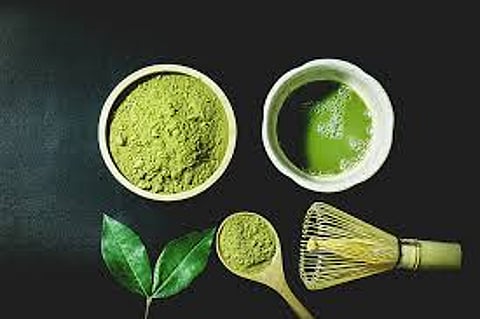Magical make up of matcha
Tea is the second most consumed beverage globally, surpassed only by water. Among the various types of teas, Japanese matcha has garnered global attention for its distinct flavour, vibrant green colour, and remarkable health benefits. Made from finely ground Tencha leaves of Camellia sinensis, matcha is a powdered form of green tea with a rich concentration of bioactive compounds, offering superior nutritional and therapeutic value compared to other teas.
What sets matcha apart is its traditional cultivation method. The tea plants are shaded for several weeks before harvest, which boosts the synthesis of specific bioactive compounds like theanine, caffeine, chlorophyll, and catechins. These compounds contribute significantly to its health-promoting properties.
Matcha is exceptionally rich in polyphenols, which can make up around 30% of its dry weight. These natural antioxidants combat oxidative stress and inflammation, acting similarly to Vitamins C and E, carotene, and tocopherol. Notably, matcha contains four main catechins — (−)-epicatechin (EC), (−)-epicatechin-3-gallate (ECG), (−)-epigallocatechin (EGC), and the highly potent (−)-epigallocatechin-3-gallate (EGCG). EGCG is the most abundant and active, offering broad-spectrum health protection.
High caffeine and theanine content
Matcha’s relatively high caffeine content (18.9-44.4 mg/g) enhances alertness and contributes to its bold flavour profile. For comparison, regular green teas contain 11.3-24.67 mg/g of caffeine, while coffee beans typically contain 10.0-12.0 mg/g. However, the presence of L-theanine balances the stimulant effect of caffeine, promoting calm alertness and reducing stress. This synergistic interaction between theanine and caffeine supports improved concentration and cognitive performance, making matcha a preferred beverage for mental clarity.
Antioxidants beyond catechins
Matcha also contains a variety of other antioxidants, such as phenolic acids, rutin, quercetin, Vitamin C, and chlorophyll. Phenolic acids are noted for their anti-inflammatory, neuroprotective, and metabolic benefits, including supporting lipid and carbohydrate metabolism. Rutin, in particular, is found in higher concentrations in matcha than in most other teas. This compound strengthens blood vessels, supports cardiovascular health, and works synergistically with Vitamin C to provide enhanced protection against oxidative and inflammatory damage.
Health benefits of matcha green tea
Anticarcinogenic properties:
Matcha’s catechins, especially EGCG, have been shown to inhibit tumour growth, angiogenesis, and the inflammatory pathways that contribute to cancer development. Additionally, phenolic acids and vitamin C contribute to cancer prevention by neutralising free radicals and supporting immune function.
Anti-inflammatory effects:
EGCG plays a central role in scavenging harmful free radicals and regulating inflammatory responses. This is critical for preventing chronic diseases rooted in long-term inflammation.
Cardiovascular protection:
Regular matcha intake may reduce oxidative stress and improve blood vessel integrity. Rutin enhances vascular strength, while EGCG inhibits inflammation and protects against cardiovascular diseases.
Cognitive health and neuroprotection:
Matcha promotes brain health through multiple mechanisms. EGCG and caffeine reduce neuroinflammation, inhibit amyloid- production (a contributor to Alzheimer’s disease), and improve insulin sensitivity in the brain. These effects may help delay or prevent neurodegenerative conditions.
Metabolic health and blood sugar control:
Matcha may assist in regulating carbohydrate metabolism. EGCG inhibits glucose absorption and lipid digestion, while rutin improves insulin sensitivity and modulates glucose uptake. These actions make matcha a valuable addition to diets targeting metabolic health.
Matcha green tea is more than just a trendy beverage; it is a powerhouse of antioxidants and bioactive compounds that support overall wellbeing. With its high content of catechins, polyphenols, and synergistic nutrients like theanine and caffeine, matcha provides a wide range of health benefits, from disease prevention and metabolic support to cognitive enhancement and cardiovascular protection. Incorporating matcha into your daily routine may be a simple yet effective way to boost your health naturally.

